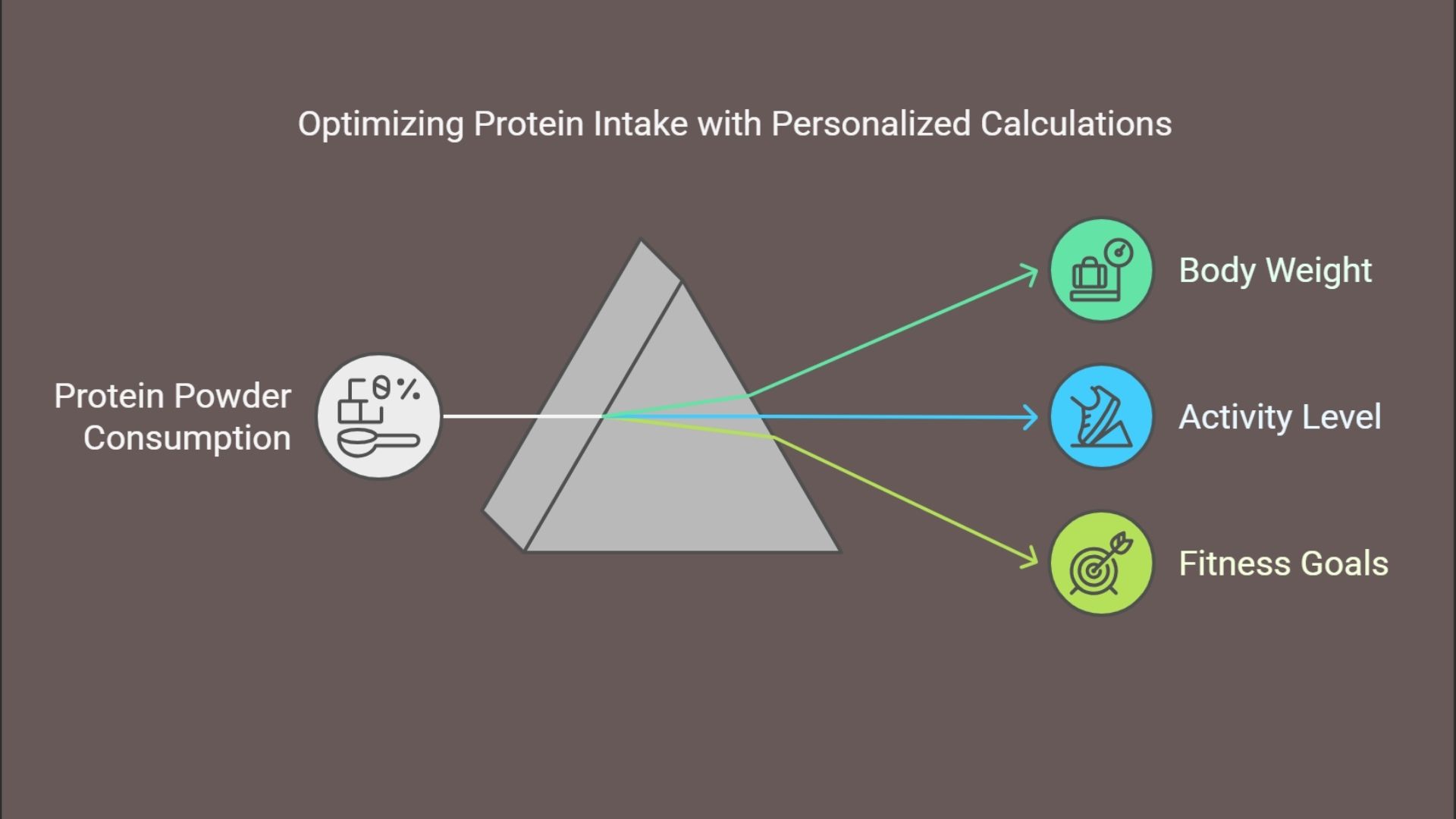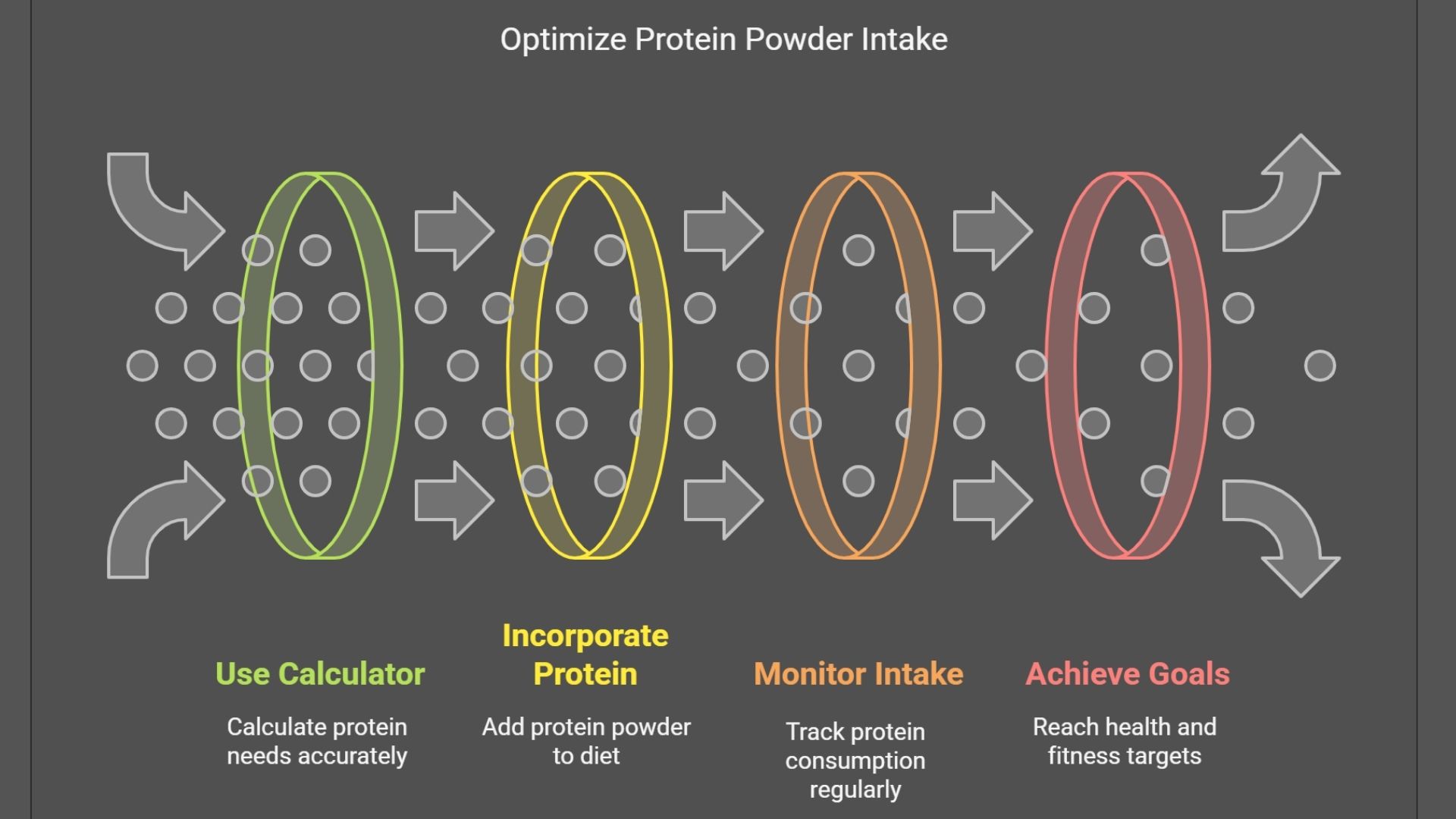Table of Contents
- Is Protein Powder Good for You?
- What Is Protein Powder and Why Is It So Popular?
- Benefits of Protein Powder Consumption
- Can You Use Protein Powder Every Day?
- Are There Any Negatives to Taking Protein Powder?
- How Much Protein Do You Need?
- Tips for Choosing the Best Protein Powder
- Optimize Your Intake with the Protein Powder Consumption Calculator
- Related Tools to Enhance Your Nutrition
- Maximize Your Nutrition with Protein Powder
Is Protein Powder Good for You?
Protein powder has become a staple for fitness enthusiasts,
athletes, and anyone looking to meet their daily protein
needs.
 Its convenience and versatility make it an attractive option for
those with busy lifestyles. Whether your goal is muscle growth,
weight loss, or general health, protein powder can play a valuable
role when used thoughtfully.
Its convenience and versatility make it an attractive option for
those with busy lifestyles. Whether your goal is muscle growth,
weight loss, or general health, protein powder can play a valuable
role when used thoughtfully.
In this blog, we’ll explore its benefits, potential downsides, and ways to maximize its use with tools like the Protein Powder Consumption Calculator.
What Is Protein Powder and Why Is It So Popular?
Protein powder is a dietary supplement made from sources like whey, casein, soy, and pea. It provides a concentrated dose of protein to help meet daily intake goals. For fitness enthusiasts, it’s often a go-to solution for muscle recovery after workouts. For others, it’s a convenient way to ensure sufficient protein intake.
But is protein powder good for your health in the long term? The answer depends on how well it complements a balanced diet. While it offers numerous benefits, it should enhance your nutritional habits, not replace whole foods.
Benefits of Protein Powder Consumption
Here are some key benefits of using protein powder:
- Convenient Nutrition: Protein powder is perfect for busy lifestyles. If you lack time to cook, a scoop mixed with water or milk can be a lifesaver, providing a quick and nutritious snack or meal replacement.
- Muscle Growth and Recovery: Does protein powder help with muscle growth? Absolutely. After resistance training, protein aids muscle repair and promotes growth. Whey protein, in particular, is a fast-absorbing option that’s ideal post-workout.
- Weight Management: Are protein powders good for weight loss? Yes, because protein increases satiety, helping you feel fuller for longer. This can reduce snacking and make calorie control easier, all while preserving muscle mass during weight loss.
-
Adaptable to Dietary Needs: Protein powders cater
to various dietary preferences:
- Whey Protein: Great for quick muscle recovery.
- Casein Protein: Releases protein slowly, making it perfect for overnight.
- Plant-Based Options: Ideal for vegans and those with lactose intolerance.
Can You Use Protein Powder Every Day?
One common question is, is it OK to use protein powder daily? Yes, it’s safe if it fits into your overall nutritional plan. However, relying solely on protein powder isn’t ideal. Whole foods like eggs, fish, and legumes provide not only protein but also essential micronutrients.
For example, a person aiming for 100 grams of protein daily could combine 40 grams from whole foods with 1–2 scoops of protein powder.
Are There Any Negatives to Taking Protein Powder?
While protein powder offers numerous benefits, there are a few potential drawbacks to be mindful of. Here's what you should consider and how to address them:
Digestive Issues
Some individuals experience bloating or discomfort, especially when using lactose-containing whey protein.
Solution: Opt for lactose-free or plant-based protein powders to minimize these effects.
Additives and Sweeteners
Certain protein powders may include excessive sugar or artificial ingredients that do not align with a healthy lifestyle.
Solution: Look for high-quality powders with minimal additives and natural sweeteners.
Overconsumption
Consuming more protein than your body requires can lead to extra calorie intake or potential kidney strain over time.
Solution: Use tools like the Protein Powder Consumption Calculator to track and manage your intake effectively.
How Much Protein Do You Need?
Protein requirements vary depending on activity level:
- Sedentary individuals: ~0.8 grams per kilogram of body weight.
- Active individuals: ~1.2–2.0 grams per kilogram, depending on workout intensity.
For example, a 70 kg (154 lb) person might need 84–140 grams of protein daily for muscle growth. Calculators like the Protein Calculator can help fine-tune your intake based on your weight and goals.
Tips for Choosing the Best Protein Powder
If you’re wondering, which protein powder is best for you? Consider these options based on your needs:
- Whey Protein: Best for fast recovery post-workout.
- Casein Protein: Ideal for slow digestion, such as before bed.
- Plant-Based Protein: Great for vegans or those with dietary restrictions.
- Hydrolyzed Protein: Pre-digested for easier absorption, suitable for sensitive stomachs.
"Protein powder isn't just a supplement; it's a tool to bridge the gap between your dietary habits and your health goals. Used thoughtfully, it empowers you to fuel your body, recover faster, and perform at your best."
Optimize Your Intake with the Protein Powder Consumption Calculator
Managing your intake is easy with the Protein Powder Consumption Calculator. By entering your weekly servings and portion sizes, you can estimate total consumption and adjust it to meet your goals.
This tool is especially helpful if you:
- Want to balance supplements with whole foods.
- Track your protein intake for fitness or weight management.
- Avoid overconsumption of protein powder.

Related Tools to Enhance Your Nutrition
Boost your overall dietary strategy with these helpful calculators:
- Egg Consumption Calculator - Easily monitor your weekly egg intake for a well-rounded diet.
- Milk Consumption Calculator - Ensure optimal milk consumption for calcium and protein needs.
- Protein Calculator - Determine the exact amount of protein your body requires based on weight and activity level.
- Omega-3 Requirement Calculator - Calculate your daily omega-3 intake to support heart and brain health.
- Magnesium Requirement Calculator - Understand your magnesium needs for muscle function and energy production.
- Vitamin D Requirement Calculator - Find out how much vitamin D you need for bone health and immunity.
Maximize Your Nutrition with Protein Powder
Protein powder can be a game-changer when used effectively. By incorporating it into your diet thoughtfully and leveraging tools like our Protein Powder Consumption Calculator , you can optimize your intake, improve your health, and achieve your fitness goals.
For more resources, explore our Nutrition Tools page and take control of your health today!
- National Institutes of Health (NIH): "Dietary Protein Intake and Human Health."
- Centers for Disease Control and Prevention (CDC): "Adults’ daily protein intake much more than recommended."
- Harvard School of Public Health: "Protein."